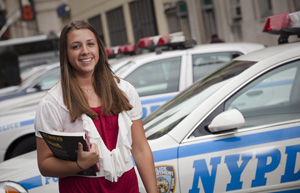Caitlin Flood ’12 (Bellerose Terrace, N.Y.), a double major in government & law and philosophy, is spending the summer as an intern with the Midtown Community Court. A part of New York’s Center for Court Innovation, the court issues community service sentences for quality-of-life offenses, such as prostitution, illegal vending, graffiti, shoplifting, and vandalism.

Caitlin Flood '12
I began my internship by sitting on the bench with Judge Richard Weinberg. At first, I felt almost as nervous as some of the defendants looked, but I soon learned exactly how the court worked and was comforted by its progressive nature.
Unlike most courts where judges are often limited to mandating jail time or a fine, MCC offers a wide array of community service opportunities and social service programs for defendants in an attempt to address the causes of the crime, instead of merely punishing the defendant.
I’ve been fortunate enough to sit in and observe many of these programs and even led a group called YIP (Youth Impact Panel). In this group, young adults learn about what quality of life crimes are, how they affect the community, and how their offense will affect their future.
My main research project has been collecting data on how many veterans come through MCC. Unfortunately, research shows that veterans are often susceptible to post-traumatic stress syndrome, substance abuse, and homelessness, which can all lead to criminal activity. Because nearly 9,000 soldiers are returning every month from Iraq and Afghanistan, there is an expected influx of veterans in the criminal justice system.
I created a veteran assessment form which allows our Alternative Sanctions Department to paint a clearer picture of the veterans coming through MCC, so we can better understand the crimes being committed and the services these veterans need. I have compiled a veteran resource packet with information about Veteran Affairs medical centers and benefits, as well as employment opportunities and housing specifically for veterans.
If the data proves that a need exists among the veteran population at MCC, the court could create a veterans’ support group. I hope that as more soldiers return, people are aware of the stress veterans face, provide the necessary resources to prevent incarceration, and create programs that properly treat veterans involved in the criminal justice system.
As an MCC intern, I’ve also been able to tour arraignment and appelate courts, a juvenille detention center, and the New York City Office of the Chief Medical Examiner where I have met people who are extremely dedicated and passionate about the criminal justice field.
Most importantly, this internship has allowed me to view restorative justice in an entirely new light. I previously thought this involved defendants making amends for their crimes by restoring the community their crime affected. MCC has sucessfully created social services programs that not only restore the community, but often are the first step in restoring defendants’ lives.
Caitlin also served as an intern last summer with Gerry Kavanaugh ’76, founder and CEO of DCS Online Communications in Washington, D.C. She performed research with Jennifer Kelly, assistant professor of music, on a book project on unsung female composers. She also served as president of Alternative School Break, coordinator for Landis Community Outreach Center’s Kids in the Community Program, and a volunteer for the Boys and Girls Club of Easton.

1 Comment
Comments are closed.